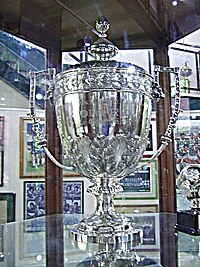Copa Rio (international tournament)
 |
|
| Founded | 1951 |
|---|---|
| Region |
Europe South America |
| Most successful club(s) |
|
The Copa Rio (Rio Cup) was the first intercontinental soccer club tournament. Brazilian press, at the time, dubbed it as "club world cup", a title that would later be applied to the Toyota Cup. Copa Rio presented a format resembling the one adopted by FIFA in the first edition of FIFA Club World Cup held in 2000.
The two editions of Copa Rio took place in Rio de Janeiro and São Paulo, Brazil and were organized by the Brazilian Football Confederation (CBD), and endorsed by FIFA. The competition was originally planned to be held every two years, therefore the second edition should have been staged in 1953. However, it was moved forward to 1952 due to a request of Fluminense, which coorganized the 1952 edition along with the CBD as part of that club's 50th Anniversary celebrations.
In 1951, Palmeiras, from Brazil, was the winner of the tournament, while Fluminense, also from Brazil and coorganizer of the 1952 event, won this title in 1952.
The competition was succeeded by another tournament, named Torneio Octogonal Rivadavia Corrêa Meyer, which was won by Vasco da Gama, of Brazil. This tournament which succeeded Copa Rio had a different composition, with the predominance of Brazilian teams (five Brazilian sides, and three foreign clubs), thus, losing part of its intercontinental aspect. In December 2007, in a negative response to a Palmeiras' request, FIFA decided that the first World Club Cup was played in 2000, thus not recognizing Copa Rio as an official FIFA competition. However, in 2014 it recognized Palmeiras as club world champions of 1951, while still maintaining that the competition was not an official FIFA tournament.
In Brazil, the competition was truly regarded as a Club World Cup, and the participating Brazilian teams (Vasco da Gama, Palmeiras, Corinthians, Fluminense) entitled to it a level of importance they would later entitle only to major football trophies such as the Brazilian League, the Copa Libertadores, the Intercontinental Cup and the FIFA Club World Cup. In Brazil, the Copa Rio was regarded as more important than the Venezuelan contemporary friendly international competition, the Pequeña Copa del Mundo. While in 1951 Vasco da Gama cancelled a trip to Europe in order to play the Copa Rio, in 1953 Vasco da Gama declined the invitation to play the "Pequeña Copa de Mundo 1953", which was eventually played and won by Corinthians (which was invited to the Venezuelan competition only after Vasco declined to participate in it).
...
Wikipedia
